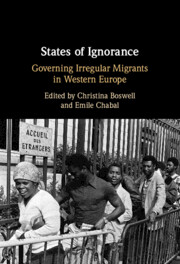63 results
Index
-
- Book:
- States of Ignorance
- Published online:
- 02 November 2023
- Print publication:
- 16 November 2023, pp 273-283
-
- Chapter
- Export citation
1 - States, Knowledge and Ignorance
-
-
- Book:
- States of Ignorance
- Published online:
- 02 November 2023
- Print publication:
- 16 November 2023, pp 33-58
-
- Chapter
- Export citation
6 - Denial, Elucidation or Resignation? British and German State Responses to Unauthorised Migrants
-
-
- Book:
- States of Ignorance
- Published online:
- 02 November 2023
- Print publication:
- 16 November 2023, pp 165-186
-
- Chapter
- Export citation
Contents
-
- Book:
- States of Ignorance
- Published online:
- 02 November 2023
- Print publication:
- 16 November 2023, pp v-vi
-
- Chapter
- Export citation
3 - The Invention of Illegal Immigration
-
-
- Book:
- States of Ignorance
- Published online:
- 02 November 2023
- Print publication:
- 16 November 2023, pp 91-116
-
- Chapter
- Export citation
Introduction
-
-
- Book:
- States of Ignorance
- Published online:
- 02 November 2023
- Print publication:
- 16 November 2023, pp 1-32
-
- Chapter
- Export citation
Copyright page
-
- Book:
- States of Ignorance
- Published online:
- 02 November 2023
- Print publication:
- 16 November 2023, pp iv-iv
-
- Chapter
- Export citation
9 - Control Infrastructures and Ignorance
-
-
- Book:
- States of Ignorance
- Published online:
- 02 November 2023
- Print publication:
- 16 November 2023, pp 243-272
-
- Chapter
- Export citation
8 - European Integration and the Leap into the Unknown
-
-
- Book:
- States of Ignorance
- Published online:
- 02 November 2023
- Print publication:
- 16 November 2023, pp 214-242
-
- Chapter
- Export citation
Acknowledgements
-
- Book:
- States of Ignorance
- Published online:
- 02 November 2023
- Print publication:
- 16 November 2023, pp ix-x
-
- Chapter
- Export citation
About the Editors and Contributors
-
- Book:
- States of Ignorance
- Published online:
- 02 November 2023
- Print publication:
- 16 November 2023, pp vii-viii
-
- Chapter
- Export citation

States of Ignorance
- Governing Irregular Migrants in Western Europe
-
- Published online:
- 02 November 2023
- Print publication:
- 16 November 2023
Index
-
- Book:
- Manufacturing Political Trust
- Published online:
- 19 February 2018
- Print publication:
- 01 March 2018, pp 215-218
-
- Chapter
- Export citation
3 - The Double Life of Targets
-
- Book:
- Manufacturing Political Trust
- Published online:
- 19 February 2018
- Print publication:
- 01 March 2018, pp 58-76
-
- Chapter
- Export citation
Contents
-
- Book:
- Manufacturing Political Trust
- Published online:
- 19 February 2018
- Print publication:
- 01 March 2018, pp v-vi
-
- Chapter
- Export citation
Bibliography
-
- Book:
- Manufacturing Political Trust
- Published online:
- 19 February 2018
- Print publication:
- 01 March 2018, pp 200-214
-
- Chapter
- Export citation
5 - Information and Trust
-
- Book:
- Manufacturing Political Trust
- Published online:
- 19 February 2018
- Print publication:
- 01 March 2018, pp 98-120
-
- Chapter
- Export citation
2 - The Problem of Political Trust
-
- Book:
- Manufacturing Political Trust
- Published online:
- 19 February 2018
- Print publication:
- 01 March 2018, pp 28-57
-
- Chapter
- Export citation
8 - After Performance Measurement?
-
- Book:
- Manufacturing Political Trust
- Published online:
- 19 February 2018
- Print publication:
- 01 March 2018, pp 178-199
-
- Chapter
- Export citation
Preface
-
- Book:
- Manufacturing Political Trust
- Published online:
- 19 February 2018
- Print publication:
- 01 March 2018, pp vii-x
-
- Chapter
- Export citation



